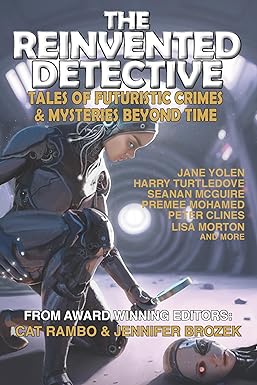
NEAR:
The Mermaids Singing, Each To Each (Clarkesworld)
Peaches of Immortality (originally appeared as The Immortality Game in Fantasy)
Long Enough and Just So Long (Lightspeed)
Therapy Buddha (20/20 Visions)
Do the Right Thing (unpublished)
10 New Metaphors for Cyberspace (Abyss & Apex)
Memories of Moments, Bright As Falling Stars (Talebones)
RealFur (Serpentarius)
A Man And His Parasite (unpublished)
Not Waving, Drowning (Redstone)
Flicka (Subversions)
Raven (Twisted Cat Tales)
Legends of the Gone (Talebones)
FAR: (much less sure about this order, suggestions welcome)
Zeppelin Follies (Crossed Genres)
Surrogates (Clockwork Phoenix 3)
Kallakak's Cousins (Asimov's)
Five Ways to Fall in Love On Planet Porcelain (unpublished)
Angry Rose's Lament (Abyss & Apex)
Fire on the Water's Heart (Membrane)
Amid the Words of War (Lightspeed)
I Come From the Dark Universe (unpublished)
Seeking Nothing (Daily SF)
Bots d'Amor (Abyss & Apex)
TimeSnip (Basement Stories)
Mother's World (Aberrant Dreams)
(If you're curious about any, all of the online ones are linked to on my fiction page – http://www.kittywumpus.net/blog/fiction/. I know there's at least one A&A link that's broken, glad to hear of any other broken links.)
I've left some stories out, because there's actually enough for a 2nd fantasy antho and a horror one, much to my surprise. I've been more prolific over the past few years than I'd realized.
In my utter arrogance, I am debating whether or not I need to hire an editor, which is normally something I'd urge anyone putting together something for self-publishing to do. My reasoning is a) most of these have undergone multiple editing passes for publication, b) I am pretty sure I can find at least one volunteer proofreader, and c) I will be doing at least one read aloud pass to polish and finetune because I'd really like this to end up looking nice and error-free.
Cover art, I have no clue about yet. If I did it myself, it'd be two stick figures dancing.
Enjoy this insight into editing and want more content like it? Check out the classes Cat gives via the Rambo Academy for Wayward Writers, which offers both on-demand and live online writing classes for fantasy and science fiction writers from Cat and other authors, including Ann Leckie, Seanan McGuire, Fran Wilde and other talents! All classes include three free slots.
Prefer to opt for weekly interaction, advice, opportunities to ask questions, and access to the Chez Rambo Discord community and critique group? Check out Cat’s Patreon. Or sample her writing here.





 The evolution of crime, punishment, and justice in the future.
The evolution of crime, punishment, and justice in the future.